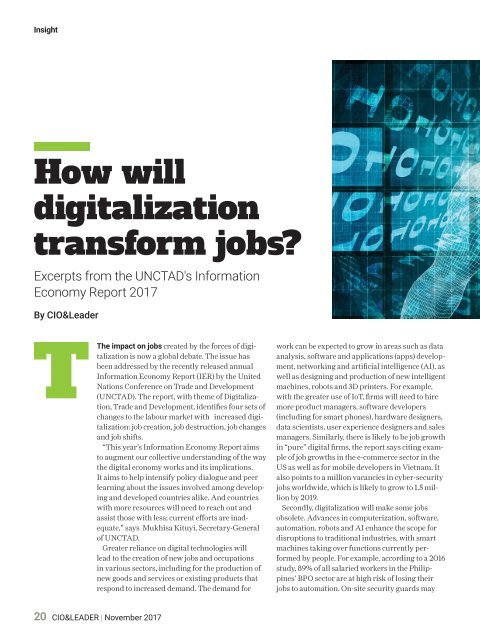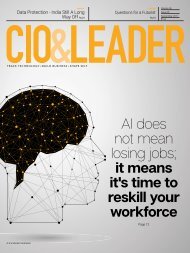CIO & LEADER-November 2017 (1)
You also want an ePaper? Increase the reach of your titles
YUMPU automatically turns print PDFs into web optimized ePapers that Google loves.
Insight<br />
How will<br />
digitalization<br />
transform jobs?<br />
Excerpts from the UNCTAD's Information<br />
Economy Report <strong>2017</strong><br />
By <strong>CIO</strong>&Leader<br />
TThe impact on jobs created by the forces of digitalization<br />
is now a global debate. The issue has<br />
been addressed by the recently released annual<br />
Information Economy Report (IER) by the United<br />
Nations Conference on Trade and Development<br />
(UNCTAD). The report, with theme of Digitalization,<br />
Trade and Development, identifies four sets of<br />
changes to the labour market with increased digitalization:<br />
job creation, job destruction, job changes<br />
and job shifts.<br />
“This year’s Information Economy Report aims<br />
to augment our collective understanding of the way<br />
the digital economy works and its implications.<br />
It aims to help intensify policy dialogue and peer<br />
learning about the issues involved among developing<br />
and developed countries alike. And countries<br />
with more resources will need to reach out and<br />
assist those with less; current efforts are inadequate,”<br />
says Mukhisa Kituyi, Secretary-General<br />
of UNCTAD.<br />
Greater reliance on digital technologies will<br />
lead to the creation of new jobs and occupations<br />
in various sectors, including for the production of<br />
new goods and services or existing products that<br />
respond to increased demand. The demand for<br />
work can be expected to grow in areas such as data<br />
analysis, software and applications (apps) development,<br />
networking and artificial intelligence (AI), as<br />
well as designing and production of new intelligent<br />
machines, robots and 3D printers. For ex<strong>amp</strong>le,<br />
with the greater use of IoT, firms will need to hire<br />
more product managers, software developers<br />
(including for smart phones), hardware designers,<br />
data scientists, user experience designers and sales<br />
managers. Similarly, there is likely to be job growth<br />
in “pure” digital firms, the report says citing ex<strong>amp</strong>le<br />
of job growths in the e-commerce sector in the<br />
US as well as for mobile developers in Vietnam. It<br />
also points to a million vacancies in cyber-security<br />
jobs worldwide, which is likely to grow to 1.5 million<br />
by 2019.<br />
Secondly, digitalization will make some jobs<br />
obsolete. Advances in computerization, software,<br />
automation, robots and AI enhance the scope for<br />
disruptions to traditional industries, with smart<br />
machines taking over functions currently performed<br />
by people. For ex<strong>amp</strong>le, according to a 2016<br />
study, 89% of all salaried workers in the Philippines’<br />
BPO sector are at high risk of losing their<br />
jobs to automation. On-site security guards may<br />
20 <strong>CIO</strong>&<strong>LEADER</strong> | <strong>November</strong> <strong>2017</strong>














